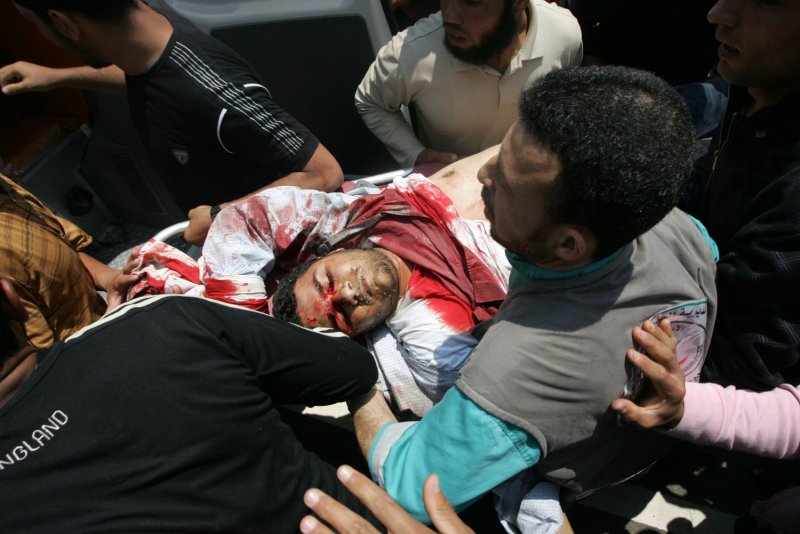1 of 10 | Palestinian youth carry photographer Mohammed Othman, wounded when Israeli troops opened fire during on a march heading towards the Erez border crossing in Beit Hanoun in northern Gaza , May 15, 2011, Palestinian medics say one person was killed and 70 others were wounded in the demonstration in the Gaza Strip, commemorating the mass displacement of Palestinians during the war surrounding Israel's establishment in 1948. as a result of which more than 760,000 Palestinians , estimated today to number 4.7 million with their descendants , were pushed into exile or driven out of their homes. UPI/Ismael Mohamad. |
License Photo
TEL AVIV, Israel, May 17 (UPI) -- There are fears that Sunday's violent protests by Palestinians on Israel's borders with Lebanon, Syria, Jordan and the Hamas-ruled Gaza Strip presages a "third intifada," a new Palestinian rebellion against Israel in the Levant.
Sunday's eruptions, in which Israeli forces killed or wounded scores of people protesting the 63rd anniversary of the founding of the Jewish state, took the Israelis by surprise.
Every year, the Palestinians commemorate the "Nakba," or catastrophe, that befell them in 1948, when hundreds of thousands of Arabs were driven from their homes or fled Israeli forces creating the Jewish state.
The ferocity of Sunday's clashes, with attempted border breaches, left the region, swept by unprecedented political turmoil since January that has toppled two Arab dictators and threatens at least three others, fearful of a new confrontation between Israel and the Palestinians.
The people of the West Bank and the Gaza Strip have twice launched "intifadas," or uprisings, against Israel, in 1987-93 and 2000-03.
Neither succeeded in ending the occupation, even at a cost of several thousand dead and wounded Palestinians and mass arrests.
But if a third intifada does erupt, it will be conducted amid a very different set of circumstances than the previous rebellions.
This time, the Arab world is in turmoil as ordinary citizens from the Atlantic Ocean to the Indian Ocean have risen up against authoritarian rulers, in monarchies and republics. They are demanding economic and political reforms and in some cases the end of the regimes that have dominated their lives for decades.
Israel fears Islamists will seize power.
Usually the Nakba commemorations pass without serious incident.
But, says analyst Reva Bhalla of the U.S. global security consultancy Stratfor, "the geopolitical climate is very different this time around and thus spells more serious consequences."
This time the Palestinians aren't alone. The Feb. 11 fall of President Hosni Mubarak in Egypt, Israel's peace partner who did little to support the Palestinian cause, has produced a military-backed interim government that's taking a drastically different line.
To Israel's great dismay, Cairo has brokered a reconciliation between Fatah, the mainstream Palestinian movement that controls the West Bank, and the fundamentalist Hamas that has ruled Gaza since June 2007.
Their ideological split suited the Israelis well. However, the reconciliation is fragile and may not hold up.
"We'll need to watch for any signs that the post-Nakba tensions will seriously undermine the reconciliation process between Hamas and Fatah, which is already fraught with complications and disagreements between the two factions," Bhalla said.
But Mahmoud Abbas, president of the Palestinian Authority and leader of Fatah, seems determined to proclaim an independent Palestinian state in September despite U.S. and Israeli objections.
Dozens of U.N. member nations have recognized the Palestinian state in the making, giving the enterprise considerable traction.
Sunday's Nakba protests were unusual because it was the first time they've been coordinated to take place simultaneously on all Israel's borders.
The clash on Lebanon's border was the bloodiest, with 10 protesters killed by Israeli soldiers. Four more were shot dead on the Syrian border, the worst blood spilled there, the quietest of Israel's frontiers, since the 1973 war.
It was the first time Syria's regime had permitted such protests, possibly because Damascus hoped it might offer relief from the unrelenting -- and unprecedented -- uprising it has been fighting since March 15.
That could mean Damascus will encourage a Palestinian rising.
Opposition groups in Syria say 800 people have been killed by the Damascus regime, which refuses to give in. So do the protesters, who demand the end of the Assad dynasty that has ruled them with a rod of iron for 40 years.
Israel is aghast at Cairo's moves toward restoring relations with Iran and the possibility of an Islamist-led government in Egypt. It's equally appalled at the prospect of regime change in Syria and another Islamist government.
Israel sees Iran's hand behind Sunday's bloodbath, although that's an unlikely possibility. But it illustrates Israel's confusion as it wonders whether it now faces a new and unfamiliar Palestinian tactic of unarmed mass protests.
Defense Minister Ehud Barak said border infiltrations are just the beginning.
"We're just at the start of this matter and it could be we'll face far more complex challenges," he warned.





